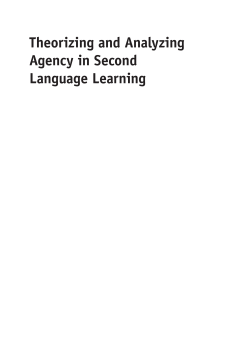
BOOK
Theorizing and Analyzing Agency in Second Language Learning
Ping Deters | Dr. Xuesong (Andy) Gao | Elizabeth R. Miller | Gergana Vitanova
(2014)
Additional Information
Book Details
Abstract
This book showcases how language learner agency can be understood and researched from varying perspectives by providing, for the first time, a collection of diverse approaches in one volume. The volume is organised into three main sections:the first sections offers an introduction to varying theoretical approaches to agency; the second section presents analyses of agency in a variety of empirical studies; and the third section focuses on the pedagogical implications of data-based studies of agency. The volume includes the work of researchers working in languages including English (ESL and EFL), Greek, Spanish, Swedish, Italian, Hindi, Marathi, Gujarati and Truku (an indigenous language in Taiwan) and with both child and adult language learners. This collection will serve as a key reference for researchers of language learning and teaching, sociolinguistics and language and identity.
This volume thoroughly surveys the different approaches to the question of agency in second-language learning. A particularly strong point of this volume is the range of learning contexts that are
presented. This focus on a range of unique learning experiences emphasizes the richness of agency as an area of research in second-language learning. This book will be a valuable resource for postgraduate students, teachers, and researchers of agency, identity, and second-language learning.
David McLoughlin, Meiji University, Tokyo, Japan
In an educational environment increasingly driven by market-place concerns and forms of hyper-regulation, careful assessment of the potential for teacher and student agency is a most timely and welcome development. This is an outstanding collection of theoretical and pedagogical perspectives – the ‘go to’ book on agency in second language education.
In my opinion, the greatest strength of the book lies principally in it being an interesting collection of different perspectives from which agency in language learning can be viewed, as well as a first-class inspiration for readers to reflect and even take action in the context of multiple agency on issues raised by the contributors. Therefore, the book itself can mediate agency in both scholars and practitioners, be it through their researching or replicating the various study proposals, or implementing the contributors’ insights into their own language classrooms.
Dorota Werbinska, Pomeranian Academy, Poland
Ping Deters is a Professor in the English Language Institute of Seneca College in Toronto, Canada.
Xuesong (Andy) Gao is an Associate Professor in the Division of English Language Education, Faculty of Education, The University of Hong Kong.
Elizabeth R. Miller is an Associate Professor in the Department of English at the University of North Carolina at Charlotte, USA.
Gergana Vitanova is an Associate Professor in the Department of Modern Languages and Literatures at the University of Central Florida, USA.
This edited volume fills a large gap in second language learning research by focusing on the critical construct of agency and provides novel ways of both theoretically and methodologically exploring how this construct is conceptualized, used and studied. Kudos to the editors and the contributors for such a fascinating and thought-provoking book.
This wide-ranging anthology is the first ever collection of the diverse theoretical, analytical and pedagogical approaches to the study of language learner agency. Reflecting a broad spectrum of research conducted by leading figures in the field, this book not only makes an excellent reader for any course on second language learning, but also a handy research reference, due to the breadth and depth of the information it conveys.
Table of Contents
| Section Title | Page | Action | Price |
|---|---|---|---|
| Contents | v | ||
| Contributors | vii | ||
| Acknowledgments | xiii | ||
| 1 Introduction to Theorizing and Analyzing Agency in Second Language Learning: Interdisciplinary Approaches | 1 | ||
| Part 1 Theoretical Approaches to Agency | 15 | ||
| 2 Structure, Agency, Individualization and the Critical Realist Challenge | 16 | ||
| 3 Dialogical View on Language Learners’ Agency: Connecting Intrapersonal with Interpersonal | 36 | ||
| 4 Examining Agency in(Second) Language Socialization Research | 53 | ||
| 5 Theorizing Young Language Learner Agency through the Lens of Multilingual Repertoires: A Sociocultural Perspective | 72 | ||
| 6 Sociological Approaches to Second Language Learning and Agency | 90 | ||
| Part 2 Analytical Approaches to Investigating Agency | 113 | ||
| 7 Performing and Accounting Language and Identity: Agency as Actors-in-(inter)action-with-tools | 114 | ||
| 8 ‘He’s the Star!’: Positioning as a Tool of Analysis to Investigate Agency and Access to Learning Opportunities in a Classroom Environment | 134 | ||
| 9 ‘Crossing’ into the L2 and Back: Agency and Native-like Ultimate Attainment by a Post-critical-period Learner | 155 | ||
| 10 Analyzing Learner Agency in Second Language Learning: A Place-based Approach | 174 | ||
| Part 3 Pedagogical Practices for Agency | 194 | ||
| 11 Agency, Anxiety and Activity: Understanding the Classroom Behavior of EFL Learners | 195 | ||
| 12 Verbalizing in the Second Language Classroom: Exploring the Role of Agency in the Internalization of Grammatical Categories | 213 | ||
| 13 Critical Discourse Analysis in a Medical English Course: Examining Learner Agency through Student Written Reflections | 232 | ||
| 14 Toward a Relationship-oriented Framework: Revisiting Agency By Listening to the Voices of Children | 252 | ||
| 15 Afterword | 271 | ||
| Author Index | 277 | ||
| Subject Index | 279 |
